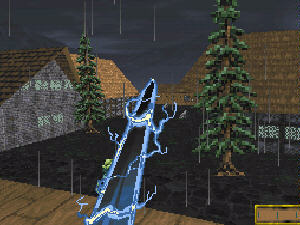Sunday 14 July 2002

|
Pic of the day: There's nothing quite like a unique, magical sword. Here the unlikely "Sword of Healing" is taken for a test drive in Daggerfall. The soul of swordsToday, apart from some eating and walking and such, I spent much of the day in the company of a talking, growing sword. Yes, I am referring to the Lilarcor plug-in for Morrowind, which I wrote about yesterday. I enjoyed it. It is an ideal companion for a brand-new character, at least for one from the fighting classes. The sword actually leveled up before my character did. This is the first time in any game that I have played with a weapon that levels up with experience. This does as much as the talking to convince me that the sword is a living thing. ***What is it about swords, anyway? The most common sub-genre of fantasy stories is often called "sword and sorcery". And I wonder: What is it that makes a common weapon, a grisly implement of war, into an enduring symbol of power in all its many facets? What gives the sword its soul? Quick and dirty psychology would point to the weapon's phallic nature: "Sword" has been used as a euphemism for the male reproductive member often enough. But this is really turning the cart before the horse. There are other weapons from the same age that would fit better visually: Mace and staff come to mind immediately. Indeed, an edged weapon in this context is really grotesque if taken as anything else than a symbol of power. The sword is phallic because, and only because, men with swords are powerful, and powerful men are sexy. In the real world, during much of history, most men with swords were actually common soldiers. Their life was usually nasty, brutish and short. Perhaps they felt powerful when raiding an unsuspecting village; but on the battlefield they met other armed men and had to fight for their lives. This was well before antibiotics were discovered, so even a minor wound could lead to a slow and painful death days later, or at least the amputation of a limb. Grisly implements of war indeed. Yet a good sword in strong and skillful hands would often beat the odds of blind luck and mean the difference between life and death. Perhaps it was the exaggerated tales of such episodes that grew into mythic proportions: A blade of high quality became magic, and its strong and skillful wielder became a hero. But it seems to me that the hero must already have been there, like a vague picture in the mind, like a dream half remembered, a role waiting for its player. And the sword becomes his symbol, an extension of his heroism or rather a manifestation of it: The heroic spirit given form. ***Or perhaps it is just a literary tradition? If so, it's an ancient one: In the New Testament the dynamic power of God's word is compared to a sword. Clearly, a sword with a spirit is not a new invention by any means. I cannot say when I first heard about a talking sword. I guess it didn't make such a great impression on me, because I was already used to swords being magic and doing impossible things. Is really seems quite natural. A sword should have some degree of sentience; it is good and proper. For the sword of a hero is not a tool like a woodsman's axe; it is a companion to whom he entrusts his life. Of course, in real life I don't have a sword as a companion and an extension of myself. So what I want to carry with me would be... a talking pocket computer! And who knows, if I only can live long enough, I just might get it. But there will be no epics written about it, that's for sure. |
Bright day. |
Yesterday <-- This month --> Tomorrow?